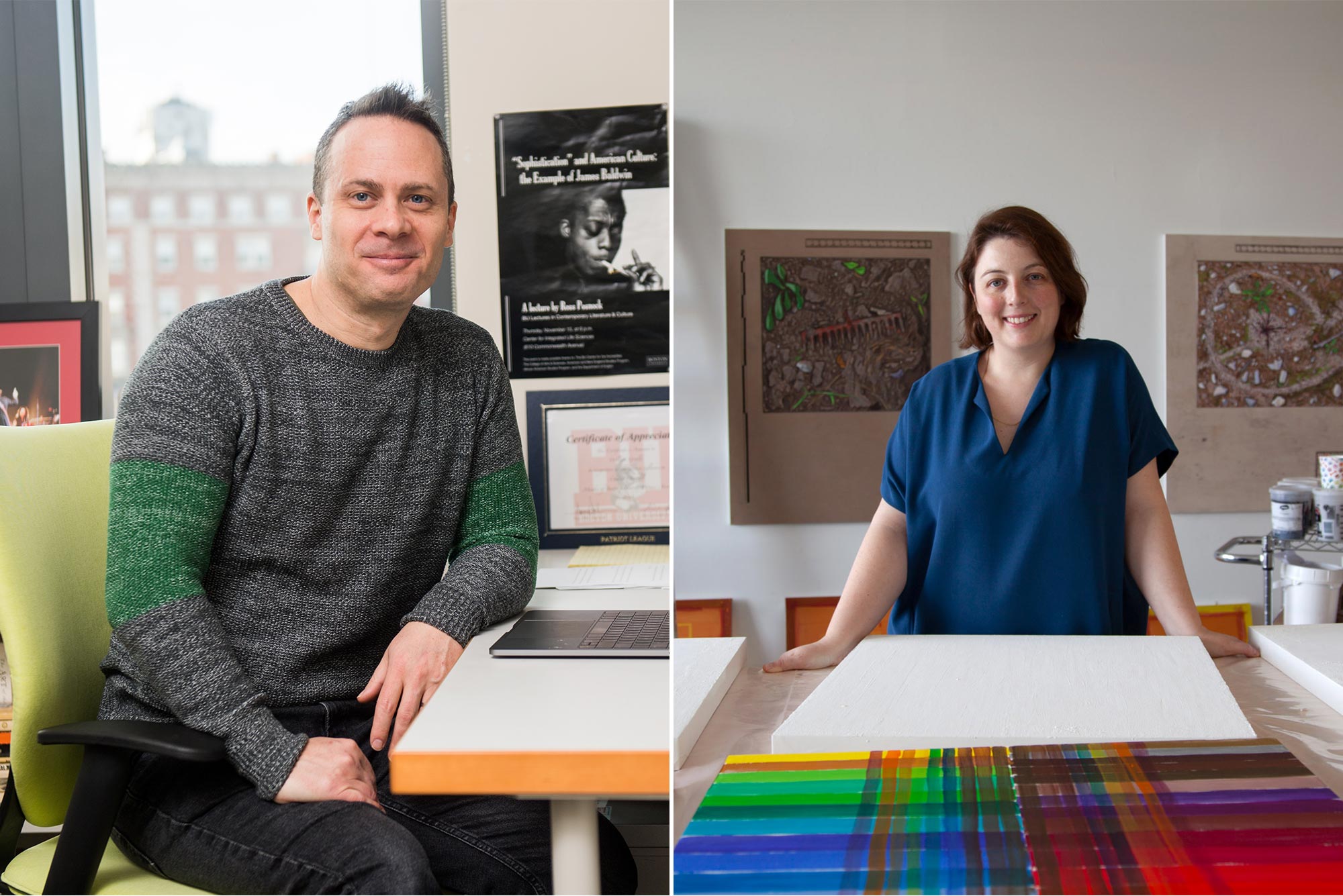William Giraldi and Josephine Halvorson Named BU’s Latest Guggenheim Fellows

This article was first published in BU Today on June 2, 2021. By Rich Barlow
EXCERPT
Through different media and from different perspectives, William Giraldi and Josephine Halvorson explore reality. Giraldi (GRS’03), a College of Arts & Sciences Writing Program master lecturer, has written one memoir, about the loss of his father, and is working on a second, about his mother’s early death, probing what makes a person who he is.
Halvorson, a College of Fine Arts professor of art and chair of the School of Visual Arts graduate studies in painting, is renowned for carefully observed still lifes and landscapes that have been shown internationally. She is now turning her artist’s eye toward what she calls our cultural “unrelenting undermining of truth.”
Their oeuvres have earned both a 2021 John Simon Guggenheim Memorial Foundation Fellowship, awarded annually to artists, scholars, and scientists who “have already demonstrated exceptional capacity for productive scholarship or exceptional creative ability in the arts.” Each of this year’s class of 184 Fellows, chosen from 3,000 applicants, receives cash awards of varying amounts.
Both winners did a double take (or more) at the emails telling them they’d won. “You have to read it a few times to make sure it isn’t a prank,” Giraldi says. “I keep waiting for the Guggenheim Foundation to realize their mistake and call to ask me for the money back.”
“I must have reread the email a few dozen times,” says Halvorson. “I was able to contact my recommenders and thank them. I write a lot of letters of recommendation, and it was nice to be on the other side.”
…
Harvey Young, dean of CFA, calls Halvorson “a painter whose works are endlessly fascinating in the way that they make you reconsider objects and places that are deceptively familiar.
“Professor Halvorson is a dedicated teacher who is committed to being an effective, engaged, and present mentor to our visual arts students. Josephine is one of the most significant painters working today—and I am thrilled that her Guggenheim fellowship will help expand the reach of her impact.”
…
Working without photographs, Halvorson paints in the plein air tradition—working out of doors in all elements and changing light conditions, often in a single sitting. Her work has won her a Fulbright Fellowship, the Rome Prize from the French Academy at the Villa Medici (she was the first American so honored), and an exhibition in 2019 at the Institute of Contemporary Art/Boston, where she was named one of four recipients of the museum’s biennial James and Audrey Foster Prize exhibition. She also creates prints and sculpture.
Halvorson frequently works in places that are personally important to her, from her home/studio in the Massachusetts Berkshires to an abandoned mine in Death Valley. Looking ahead, she says she plans to “make art that further integrates my painting practice with a journalistic sensibility. I’ve been asking myself how, as an artist, I can offer evidence, veracity, and accountability. My practice, direct as it is, requires me to believe my eyes, follow my perception, and transcribe what I see through the medium of paint and stand by it.
“The paint can’t lie.”
She joined BU in 2016. “In the last five years,” she says, “I helped to secure greater and more equitable funding for all students, initiated a lecture series that has welcomed over 80 artists to Boston, and collaborated with other departments and institutions.”
GRADUATE PAINTING AT CFA
The Master of Fine Arts (MFA) program in Painting at Boston University promotes the discipline in its varied manifestations as a fundamental form of artistic expression. At its core, the program is studio-driven, with rigorous expectations about each student’s commitment to their own artistic practice. As an art form, painting is more than just an activity; it is a long-term critical engagement with ideas, feelings, and sensibilities. As such, the program supplements this emphasis on the studio with critical dialogue, in the form of studio visits, critiques, weekly seminars, lectures, field trips, and workshops.
Graduate students develop close working relationships with both faculty and peers, forging a tight-knit community that continues beyond graduation. Frequent visits from major figures in the contemporary art world, as well as regular trips within New England, New York City, and beyond, bolster this sense of community and prepare students for a life in painting. Real world experience, critical dialogue, and an intensive studio climate support each student’s journey toward an ever-sharpening artistic vision.